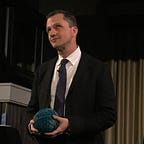It Isn’t a Marathon Either.
In a time of crisis, focus on Why not When
In his seminal book Man’s Search for Meaning, famed psychologist Viktor Frankl explores traits of people who are able to withstand years of crisis.
His central thesis can be summarized by Nietzsche:
“he who has a why to live for can bear almost any how”.
Frankl suggests that in the midst of extremely difficult times, we “can only live by looking to the future — sub specie aeternitatis.” Having a “why” to live for becomes our “salvation in the most difficult moments of existence.”
But there’s a catch: Live for the future, Frankl tells us, but don’t set a date.
There are countless stories of hostages who mark down the days until their freedom. According to Frankl, those that live for an unspecified future survive. Those that believe that their salvation will arrive on a specific day — by Christmas, by the end of the year — are doomed. The day comes and goes, and the hostage “becomes subject to mental and physical decay.”
Live for the future, Frankl tells us, but don’t set a date.
Live for a Goal not a Deadline
In the early days of the COVID-19 pandemic, the phrase “It’s a marathon, not a sprint” became a rallying cry.
I’ve come to realize that this analogy is flawed. A marathon ends after 26.2 miles. It is far, far longer than a sprint, but still delimited. It allows you to pine after a deadline: When there’s a vaccine; When the economy recovers; After the election.
What happens if you round the last bend of the Marathon to find the finish line has been moved back by another 26.2 miles?
Frankl suggests that to survive a long crisis, we must live for a goal not a deadline. Your mission. Your values. Your meaning. Put your focus there.
Focus on Why not When
Abraham Lincoln had no idea that his entire presidency would be consumed by the Civil War. But he was very clear about his unflinching mission to hold the country together at all costs. As Ryan Holiday remarks in The Obstacle is the Way, “As crafty and ambitious and smart as he was, Lincoln’s real strength was his will: the way he was able to resign himself to an onerous task without giving in to hopelessness”
Lincoln didn’t ruminate on whether the Civil War would be a sprint, a marathon or something else. Instead he dug in and focused on Why not When.
A hundred years later, in his inaugural address, John F. Kennedy articulated the the clarity of Why versus the opacity of When:
All this will not be finished in the first one hundred days. Nor will it be finished in the first one thousand days, nor in the life of this Administration, nor even perhaps in our lifetime on this planet. But let us begin.
“Let us begin,” he said, to a country gripped by the Cold War. Even if our Goal outlives our Lives, he said. Let us Begin. While Kennedy died tragically after one thousand days, his Why has lived on after his lifetime on this planet.
At home, at work, and in your mind — consider your Why. Focus on it, clarify it, write it down, say it out loud. In the midst of a perpetual crisis, aim your force of will toward Why not When.
Until there is a vaccine, you have your Why.
Until the economy improves, you have your Why.
Whatever the political environment, you have your Why.
And that shall be your salvation.
It is not a sprint
Not a Marathon either
Focus on your Why
